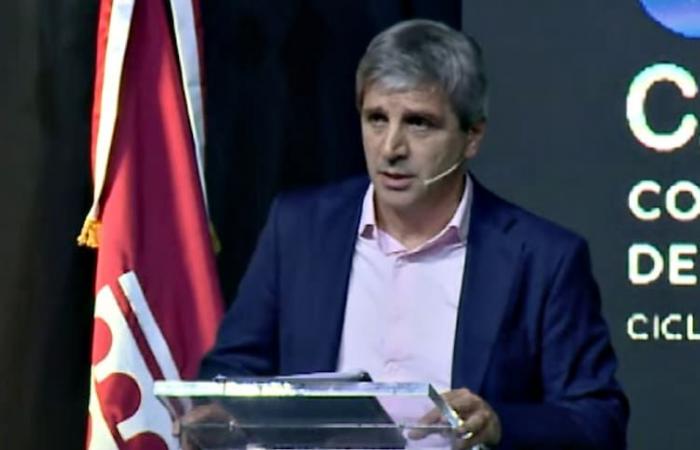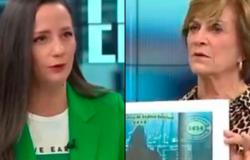
Hear
The Minister of Economy, Luis Caputo, promised that the Government will lower 90% of taxes by the end of President Javier Milei’s term and asked businessmen to bet on the model. “For serial devaluators: the way is not to devalue, but to sharply lower the tax burden. Argentina needs to lower 90% of taxes: Gross Income, the check tax, double VAT,” listed the head of the Treasury Palace.
When closing the Convention of the Argentine Chamber of Construction (Camarco), which was held at the La Rural property, in Palermo, under the motto “Builders of Dialogue”, Caputo also relativized the rise of the blue dollar in recent days that brought the gap with the official to 45%. “The exchange rate rose 10% in 6 months. The previous government went from 60 to 1,200 pesos. There are no more journalists crying on television; In those four years they lost their social sensitivity; 1,000 had enough money to go with their families to Qatar for the World Cup,” said the minister, adding to the President’s periodic criticism of the media.
“In this Government you swear by God, by the Homeland and the fiscal balance,” defined one of the men who knew how to represent the ruling party and who in La Rural shook hands with the head of Camarco, Gustavo Weiss. Precisely he, while Caputo was listening, maintained that the control of public spending and the consequent paralysis of the works caused “a hard and forceful blow” to the sector. Minutes later, the minister did not avoid criticism about “when the recovery comes” and recalled the starting point since his administration began: “Let us understand that four more years of Kirchnerism did not take us to Germany, but to Venezuela.”
At the event that brought together the main construction businessmen, a dichotomy flew over that, almost like a Boca – River, posed: “public works or fiscal adjustment.” Businessmen, governors and Caputo himself participated in that debate. In that sense, he explained that “very important, painful but necessary measures had to be taken.” In this way, the minister tried to convey the idea that fiscal balance is “the basis” for everything else.
A similar view was expressed in a previous panel by the governor of Mendoza, Alfredo Cornejo, who said that “fiscal balance is a sine qua non.” Although he also warned that that alone is not enough to have growth.
Regarding the need to reactivate infrastructure works, the governor of Cordoba, Martín Llaryora, was more specific: “If you believe that it is possible to develop without public works, we are in trouble.”
This multiplicity of views fed a business audience eager to hear definitions about the arrival of recovery. In fact, the passage in which the most applause was heard was when the UOCRA union member, Gerardo Martínez, very emphatically, pronounced: “It is time to demonstrate that we are in a position to carry out the works that the country needs in “immediate.”
In the preview, Weiss announced that “the question the sector is asking is when the recovery will come.” For Camarco, public works are essential in the search for said reactivation and that requires investment from the State. An important businessman, sitting in the front rows, declared that, in his view, Caputo’s speech revealed that he “prioritizes fiscal balance over public works.” In contrast, another representative of the sector was more understanding and described that “the Government is on its learning curve” in relation to managing the impact of the adjustment.
According to Martínez, 130,000 job losses were recorded in the union sector. Weiss’s numbers indicate 100,000, although he clarifies that this calculation does not take into account the indirect jobs generated by construction.
The minister’s words were tinged with a touch of realism: “Miracles cannot be done, getting out of those clubs (in relation to Kirchnerist policies) is not free.” Caputo asked the private sector to trust the Government’s commitment, in the change of country it is promoting and, in the long term, promised a reduction of “90% of taxes” by the end of the mandate. “That is the way,” he defined.
Although the minister stressed the need to put the macroeconomy in order so that the surplus can begin the path to lower taxes, his speech included a short-term mention directly linked to the transfer of works to the provinces.
In that sense, he listed that the Government transferred about 900 projects to subnational jurisdictions. For the Executive, this would seem to be the closest path to reactivation. For Weiss, “it takes a while until the provinces put them into action.”
The head of Camarco was harsh when stating that “the lack of perspectives darkens the outlook.” Despite this, Government representatives defended the transfer policy. Earlier, the Secretary of Public Works, Luis Giovine, detailed that more than 2,000 works were part of agreements between the Nation and provinces or municipalities. These projects, in the words of officials, “are minor” and do not merit financing from the Executive. Giovine showed photos of them. These are sidewalks, gutters, pool roofs, squares, among others. “That is not works, that is politics,” stated Caputo.
Therefore, the minister defended fiscal balance and asked businessmen not to be carried away by “the fear” that, according to his vision, is generated by Kirchnerism and those who “seek to hinder everything.” Aware of this but a victim of paralysis, that former member of the ruling party who shook hands with Weiss withdrew from La Rural with the “desire” that after the Bases Law the Government’s agenda would change and “other things could also start.”





